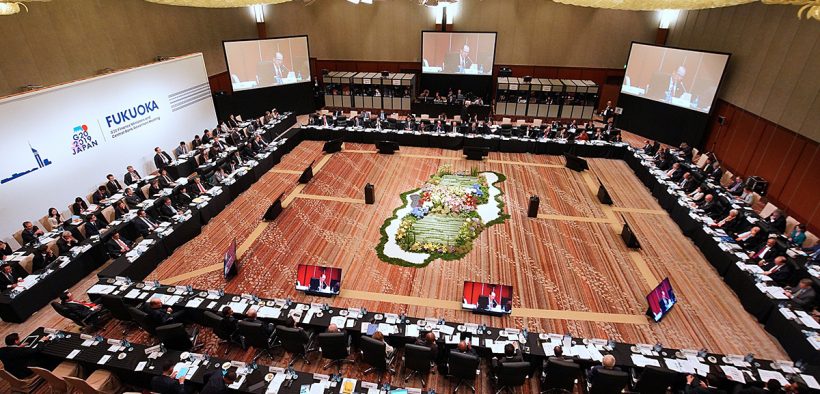Three Takeaways From the G20 Finance Ministers’ Meeting

“However, growth remains low, and risks remain tilted to the downside. Most importantly, trade and geopolitical tensions have intensified.”
On Sunday, June 9, finance ministers and central bank chiefs of the G20 countries wrapped up the group’s ministerial meeting in Fukuoka, Japan, calling for policies to maintain global growth amid intensifying geopolitical and trade tensions.
Despite not referring directly to the trade dispute between the U.S. and China, participating finance leaders at the meeting agreed that it was the top concern. “However, growth remains low, and risks remain tilted to the downside. Most importantly, trade and geopolitical tensions have intensified. We will continue to address these risks, and stand ready to take further action,” the G20 finance ministers stated in a communique.
The communique also included a commitment to bolstering debt transparency for both lenders and borrowers and to make a sustainable infrastructure project. The latter initiative was launched amid complaints that China’s ambitious Belt and Road infrastructure drive is a debt-trap to poor nations.
Three Key Points From G20 Finance Chiefs’ Meeting
The U.S-China Trade War is Still the Main Concern:
International Monetary Fund (IMF) Managing Director Christine Lagard called on the G-20 member countries to resolve the trade war involving the world’s biggest economies, adding that such a dispute will severely harm the global growth. “The first priority should be to resolve the current trade tensions,” Lagarde stated. The former French finance minister also cited IMF estimates that the U.S.-China trade war could cut global GDP by 0.5% in 2020, or around $455 billion.
The trade war began between the U.S. and China when U.S. President Donald Trump accused Beijing of unfair business practices.
In response, Trump imposed a 10% tariff on Chinese imported goods worth $200 billion, effective starting September 24, 2018. China retaliated by applying tariffs on America’s products worth $60 billion.
Trump stated he is ready to slap a new tariff on China if his Chinese counterpart, President Xi Jinping, fails to make progress during trade negotiations in the upcoming G-20 leaders’ meeting in Osaka at the end of this month.
“We are scheduled to talk and to meet. I think the interesting things will happen. Let’s see what happens,” Trump briefed reporters at the White House.
However, a final G20 communique removed a clause to “recognize the pressing need to resolve trade tensions” from the initial draft, at Washington’s request.
Taxing Digital Companies:
The G-20 members’ finance chiefs agreed to formulate regulations that can block loopholes for tech giants which allow them to evade taxes. Tech titans such as Amazon, Facebook and Google are criticized for evading taxes by recording profits in developing nations. The new laws are expected to be effective next year, meaning that higher tax burdens will be imposed on multinational firms. France and the U.K. recently called for a proposal to impose a tax on tech giants which is aimed at halting firms from shifting their profits to lower tax haven countries such as Luxembourg.
“We welcome the recent progress on addressing the tax challenges arising from digitization and endorse the ambitious program that consists of a two-pillar approach. We will redouble our efforts for a consensus-based solution with a final report by 2020,” the G20 communique said.
Aging Population and the Decline of the Birthrate:
For the first time in history, an aging population, which is a significant problem in Japan, became one of the top concerns at the G-20 meeting.
The world is expected to have more than two billion residents older than 60 by 2050, more than double the size of 2017’s aging population, the Organization on Economic Cooperation and Development (OECD) estimated.
OECD Chief Ange Gurria said the aging problem is not something that can be abruptly stopped.
“You basically have a very large portion of mankind that is aging and then the workforce is shrinking. But I would say the G20 in particular are aging faster,” OECD secretary-general Angel Gurria told AFP.
According to The National Institute of Population and Social Security Research estimate, a quarter of breadwinners in Japan will be older than 75 by 2040. The country’s costly living expenses and a wider opportunity for women to pursue their careers have contributed to the decline in the birthrate. Several studies predicted that the population of Japan will shrink to 87 million by 2060.
What to Expect from the Upcoming Meeting in Osaka?
G-20 leaders will gather in Osaka June 28 to 29. The success of the meeting will likely depend on whether Trump and Xi can resolve the prolonged trade war that has affected global growth.
U.S Secretary of Treasury Steven Mnuchin denied the trade dispute has ruined U.S. growth, promising that Washington would provide assistance to affected producers and consumers. Mnuchin’s Japanese counterpart Taro Aso could voice his optimism that the multilateral meeting is the answer to a trade imbalance.
However, as long as Trump’s foreign policy insists on using tariffs to force a trade partner to compromise, the tension may not go away soon.







